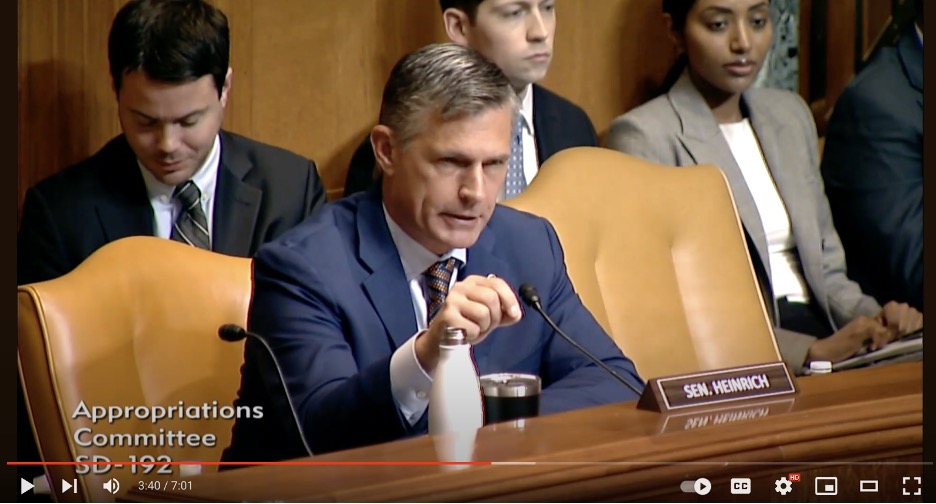Attorney General Merrick Garland Calls Heinrich-Led Provisions in Safer Communities Act “Most Important Gun Legislation in Decades”
In key hearing, Heinrich presses AG Garland on the impact of legislation he fought to pass, questions Garland on the tracking and interdiction of illicit fentanyl, and access to addiction treatment medication
WASHINGTON – In a key hearing before the Senate Appropriations Subcommittee on Commerce, Justice, Science, and Related Agencies, U.S. Senator Martin Heinrich (D-N.M.) questioned U.S. Attorney General Merrick Garland about the U.S. Department of Justice’s enforcement of two important provisions that he authored with U.S. Senator Susan Collins (R-Maine) within the Bipartisan Safer Communities Act (BSCA). These provisions enhanced the penalties for unlawful straw purchasing and made it illegal to traffic firearms out of the United States – firearms that had fueled violence at the root of migration north. Garland reflected on the success of Heinrich’s Bipartisan Safer Communities Act — labeling it the “most important gun legislation in decades.” 
Heinrich began his questioning: “Attorney General, as you know, Vice Chair Collins and I worked very hard on a number of provisions in the Bipartisan Safer Communities Act with respect to both straw purchasing of firearms and also gun trafficking offenses. Can you give us an update about how the Department is using those new offenses and what progress you’re making on that front?”
Garland responded, outlining the success of the legislation, particularly Heinrich’s provisions: “That act is really the most important gun legislation in decades and has already had a significant impact on our ability to prevent guns from falling in the hands of people who are prohibited by Congress from obtaining them because of their dangerousness. So, as a consequence of the act, which extended background checks for people under 21, we have been able to run 245,000 enhanced background checks, and we have denied 700 transactions which otherwise would have gone through.
Garland continued: “With respect to the straw purchases provisions, we have charged more than 42o defendants now with illegal straw purchases under the provisions of BSCA and associated statutes we have on straw purchases. So I’d say it’s early days, but it’s been very effective.”
Heinrich followed up, pressing Garland on the impact of the gun trafficking provisions he secured: “What about the gun trafficking authority? Has that been helpful as well?”
Garland answered: “Yes. The gun trafficking allows us a separate crime and separate penalty for trafficking guns where it’s known that the guns are going to be used in crime. And those have also led to successful prosecutions.”
Following Heinrich’s questioning, U.S. Senator Susan Collins (R-Maine) thanked Garland for highlighting the effectiveness of the provisions in the Bipartisan Safer Communities Act that she authored with Heinrich: “I very much appreciated hearing the update on the effectiveness of the straw purchasing and gun trafficking provisions that Senator Heinrich and I authored. So, I won’t have to ask you about that issue.”
During his questions, Heinrich also called on Attorney General Garland to coordinate closely with the U.S. Department of Homeland Security—and to enhance cooperation with his counterparts in Mexico and China—to interdict illicit fentanyl that is coming into the United States through land ports of entry.
Heinrich secured a provision in the recently passed Fiscal Year 2024 Commerce, Justice, and Science Appropriations Bill to require the Drug Enforcement Agency (DEA) to develop a comprehensive, nationwide fentanyl tracking system. This new, comprehensive tracking system will be critical to better understanding the movement of illicit drugs into and within the United States and more effectively combatting the fentanyl drug epidemic. The system will track and document where fentanyl is seized, the chemical composition of seized substances, probable or known manufacturing locations, and probable or known points of entry into the United States.
Heinrich also pressed Attorney General Garland to increase access to opioid use disorder medications. Heinrich secured new language in the recently passed Appropriations bill directing the DEA to further remove barriers to access for opioid use disorder medications—like buprenorphine. That language clarifies the difference between suspicious orders of opioids and orders of buprenorphine in the DEA’s Report System. This will make it much easier for local medical and mental health providers to prescribe effective treatment for more New Mexicans struggling with opioid addiction.
###